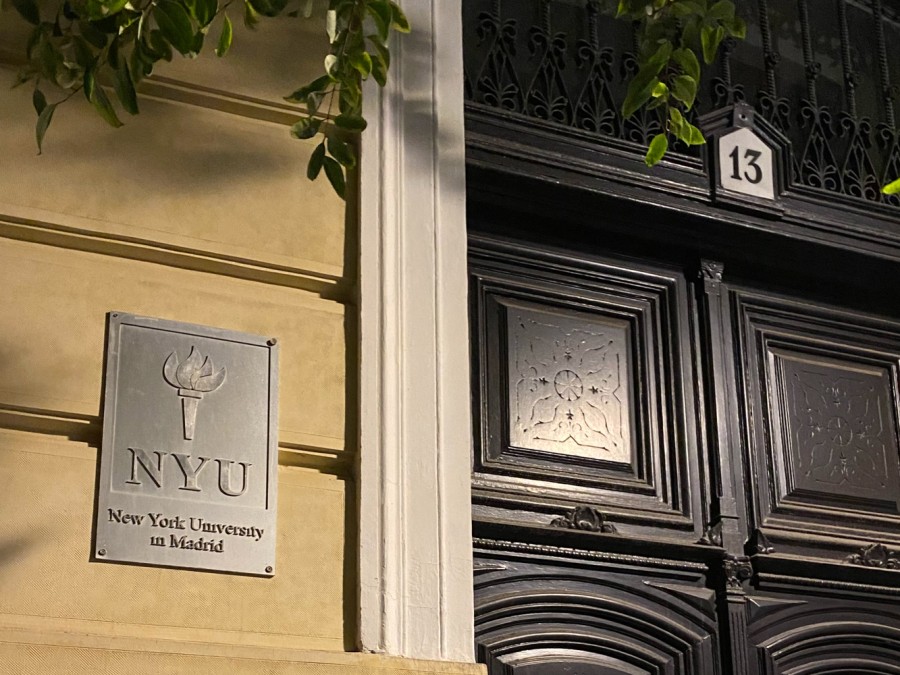How to actually improve your Spanish at NYU Madrid
Can you really become fluent after one semester abroad? Here’s your guide to incorporating the city into your language learning journey.
One student’s advice for those attempting to learn Spanish during their semester abroad in Spain. (Carina Christo for WSN)
February 24, 2023
You showed up in Madrid for your semester abroad, and you assumed you were prepared. You nailed down the euro to dollar conversion, and you figured out when is best to FaceTime your besties from home given the time difference. Someone on TikTok informed you that sangria isn’t popular in winter, so you ironically vowed to stick to tinto de verano until at least March. But despite all that, it turns out there was one more beast to tackle — and it’s perhaps the biggest of them all. Were you prepared to learn the language?
In an iconic episode of “Caso Cerrado,” host Ana Maria Polo — who is basically the Cuban Judge Judy, but 10 times better — once said that a person who speaks two languages is bilingual, a person who speaks three is trilingual and a person who speaks one language is American.
Maybe you’re inspired to learn the Spanish language because you find it to be beautiful, or because you want to bedazzle your LinkedIn. Maybe you ache to connect with your hispanic roots as a “no sabo” latine. At the very least, I’m willing to bet you have an appreciation for other cultures and don’t want to come off as an ignorant American.
Whether you’re studying in Madrid right now or planning to in the future, I’ve created a list of five tips to help you improve your Spanish as much as possible while abroad.
Have confidence in your abilities
Perhaps you’ve heard the stereotype that service workers in Paris will always respond to Americans in English. Since this may also happen in Madrid, it’s best to devise a plan to tackle the anxiety that comes with a barista answering you in English. Embarrassment, shock, confusion — whatever you’re feeling, it’s OK. Own it and understand that a 15-second conversation does not define your intellect, or even your true knowledge of a foreign language. The other party may speak English, even if it’s limited, as a way to help you out. Respond in Spanish and see what happens. You could always say, “I know you speak English, but I would like to practice my Spanish, please,” acknowledging their abilities as well. But be realistic. If there is a line of people out the door side-eyeing you, and your every other word is “um,” then maybe it’s time to surrender. Don’t worry — you’ll have plenty more opportunities to practice.
Consistency is key
If there’s anything I remember from my high school health class, it’s the idea of SMART goals — specific, measurable, attainable, relevant, timed — which is a somewhat corny methodology that was ingrained into my brain as a teenager. Setting a New Year’s resolution is nothing more than a manifestation until you take the steps to reach that goal. I personally have been committed to completing two lessons on Duolingo and listening to one Spanish podcast each day, with a few TV episodes or YouTube videos in Spanish sprinkled throughout the week. Take advantage of the fact that you’re in a Spanish-speaking country. Madrid is home to plenty of movie theaters, museums, dance classes and performances that allow you to practice the language while exploring the city. Make sure you’re taking a well-rounded approach, too, practicing listening, speaking, reading and writing.
Actually do your homework
If you’re studying in Madrid, then you’re guaranteed to be taking at least one Spanish course. As easy as it may be to skip readings and still get by in New York, avoiding language assignments while abroad won’t do you any favors. If you really want to learn, you’ll have to pay attention to words that you don’t know and follow up on questions. Make “SpanishDict” your best friend instead of Google Translate.
Have conversation with native speakers
Meeting people whose first language is Spanish may be the most exciting way to practice a foreign language, especially if they’re your age. NYU offers opportunities to participate in a language exchange, which hosts weekly activities like bachata lessons, board games and bowling with Spanish university students. Discotecas, or nightclubs, are also a fun way to meet people — you can pregame by chatting with taxi drivers and restaurant workers. As travel YouTuber Jo Franco says, you can even use dating apps to make friends while abroad, allowing you to learn Spanish from a native speaker and have your own personal tour guide.
Immerse yourself in Spanish media
Since Spanish has so many different dialects and accents, it’s important to brush up on your listening skills, especially if you do not have much practice listening to Peninsular Spanish. Binge-watching TV shows set in Spain, such as “Elite,” “Money Heist,” “Smiley” and “Cable Girls,” or tuning in to podcasts like “LightSpeed Spanish,” “Hoy en EL PAÍS,” “Radio Ambulante” and “COOLture” can be a great way to expose yourself to authentic dialogue. As someone inclined to multitask, I think audio content is a convenient option — there’s something for everyone.
¡Buena suerte, lo tienes!
Contact Carina Christo at [email protected].
























































































































































